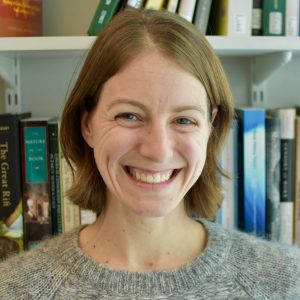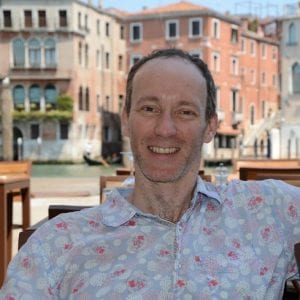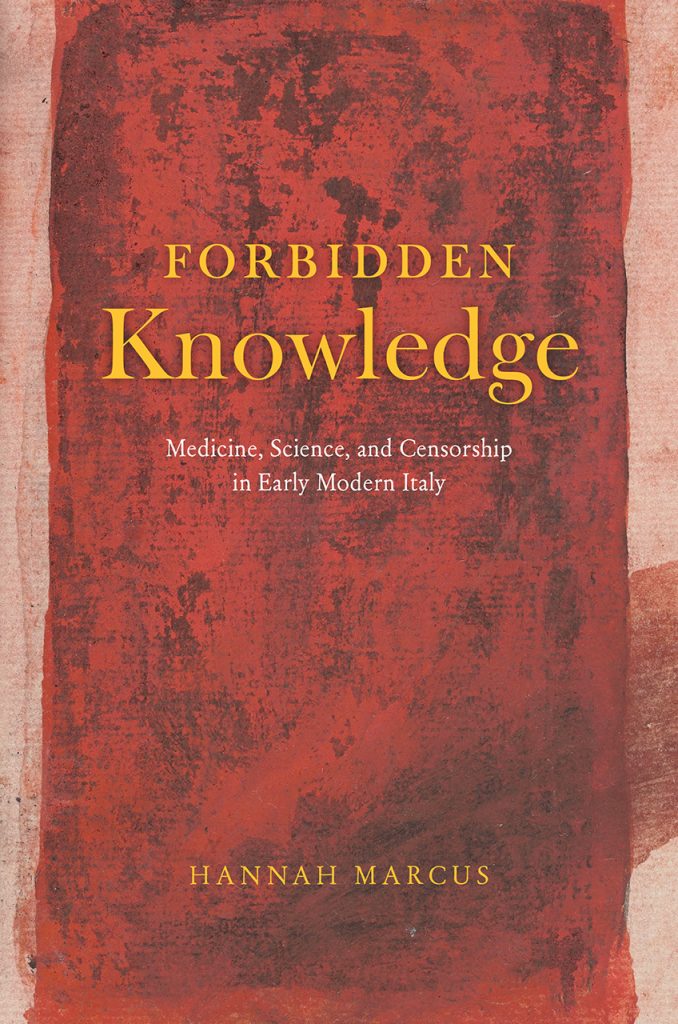Forbidden Knowledge: Author Hannah Marcus in Conversation with Nick Wilding on Medicine, Science, and Censorship in Early Modern Italy
Date:
18 November 2020
Time: 3:00–4:00 p.m. ET
Location: Zoom
Presented by: The Andrew W. Mellon Society of Fellows in Critical Bibliography
A 40-minute presentation followed by 20 minutes of Q&A scheduled for Wednesday, 18 November 2020, 3:00–4:00 p.m. ET, via Zoom.
Owing to Zoom’s restrictions, this event is limited to the first 300 people who register. The event will be recorded and made available for viewing on the RBS YouTube channel.
Join author Hannah Marcus and RBS faculty member Nick Wilding for a conversation about Marcus’s book Forbidden Knowledge: Medicine, Science, and Censorship in Early Modern Italy (University of Chicago Press, 2020). This event is part of a series celebrating new books in critical bibliography, and is sponsored by Rare Book School’s Andrew W. Mellon Society of Fellows in Critical Bibliography (SoFCB).
Everyone is welcome to attend. To ensure the security of the event, advance registration is required; to register, click here. Registration closes at 8 a.m. ET the day of the event. Your registration will be automatically accepted. You will receive an email reminder the day before the event. The day of the event, we will send you the Zoom URL and password. Please direct any questions to RBS Programs at rbs-events@virginia.edu.
A chapter from Forbidden Knowledge: Medicine, Science, and Censorship in Early Modern Italy will be shared with registrants in advance of the event.
 Hannah Marcus is an assistant professor in the Department of the History of Science at Harvard University. Her research focuses on the scientific culture of early modern Europe between 1400 and 1700. Marcus’s first book, Forbidden Knowledge: Medicine, Science, and Censorship in Early Modern Italy (University of Chicago Press, 2020), explores the censorship of medical books from their proliferation in print through the prohibitions placed on many of these texts during the Counter-Reformation. This account explains how and why the books prohibited by the Catholic Church in Italy ended up back on the shelves of private and public Italian libraries in the seventeenth century. Her second book project, “Methuselah’s Children: The Renaissance Discovery of Old Age,” is a study of ideas about longevity and experiences of advanced old age in a period when the average life expectancy was 35. She is also writing a book with Paula Findlen about Galileo’s correspondence called “Galileo’s Letters: Experiments in Friendship,” which grows out of their collaboration on The Galileo Correspondence Project. Her public writing has appeared in The New York Times, Scientific American, and The Conversation, among other venues. She is a senior fellow in the Andrew W. Mellon Society of Fellows in Critical Bibliography at Rare Book School.
Hannah Marcus is an assistant professor in the Department of the History of Science at Harvard University. Her research focuses on the scientific culture of early modern Europe between 1400 and 1700. Marcus’s first book, Forbidden Knowledge: Medicine, Science, and Censorship in Early Modern Italy (University of Chicago Press, 2020), explores the censorship of medical books from their proliferation in print through the prohibitions placed on many of these texts during the Counter-Reformation. This account explains how and why the books prohibited by the Catholic Church in Italy ended up back on the shelves of private and public Italian libraries in the seventeenth century. Her second book project, “Methuselah’s Children: The Renaissance Discovery of Old Age,” is a study of ideas about longevity and experiences of advanced old age in a period when the average life expectancy was 35. She is also writing a book with Paula Findlen about Galileo’s correspondence called “Galileo’s Letters: Experiments in Friendship,” which grows out of their collaboration on The Galileo Correspondence Project. Her public writing has appeared in The New York Times, Scientific American, and The Conversation, among other venues. She is a senior fellow in the Andrew W. Mellon Society of Fellows in Critical Bibliography at Rare Book School.
 Nick Wilding is a historian of Early Modern Europe who specializes in the history of science, and the history of the book. He is the author of two books: Galileo’s Idol: Gianfrancesco Sagredo and the Politics of Knowledge (University of Chicago Press, 2014) and Faussaire de Lune (Bibliothèque Nationale de France, 2016), as well as several journal articles. He has held fellowships at the Medici Archive Project, Stanford, Cambridge, Columbia, the American Academy in Rome, the New York Academy of Medicine, and Rare Book School, where he also teaches. His current research on book forgery has been featured in The New York Times and The New Yorker. He is a senior fellow in the Andrew W. Mellon Society of Fellows in Critical Bibliography at Rare Book School.
Nick Wilding is a historian of Early Modern Europe who specializes in the history of science, and the history of the book. He is the author of two books: Galileo’s Idol: Gianfrancesco Sagredo and the Politics of Knowledge (University of Chicago Press, 2014) and Faussaire de Lune (Bibliothèque Nationale de France, 2016), as well as several journal articles. He has held fellowships at the Medici Archive Project, Stanford, Cambridge, Columbia, the American Academy in Rome, the New York Academy of Medicine, and Rare Book School, where he also teaches. His current research on book forgery has been featured in The New York Times and The New Yorker. He is a senior fellow in the Andrew W. Mellon Society of Fellows in Critical Bibliography at Rare Book School.
Elizabeth Yale, senior fellow in the Andrew W. Mellon Society of Fellows in Critical Bibliography at Rare Book School, will be moderating the event. She is a lecturer in the Department of History at the University of Iowa, where she teaches courses on the history of science, the history of the book, and European history. She is the author of Sociable Knowledge: Natural History and the Nation in Early Modern Britain (University of Pennsylvania Press, 2016).
Follow the conversation on social media using hashtags #SoFCB, #RBSOnline, and #ForbiddenKnowledge.

